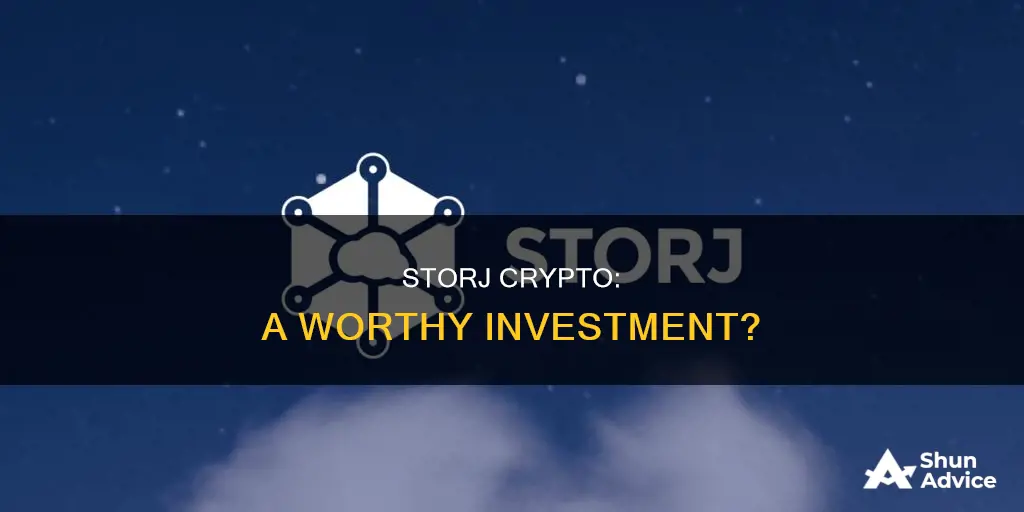
Storj (pronounced storage) is an open-source, decentralised cloud storage platform that leverages blockchain technology to distribute and store data across a global network of independent nodes. It was founded in 2014 by Shawn Wilkinson, John Quinn, and Tome Boshevski, and is built on the Ethereum blockchain. The platform uses its native cryptocurrency, STORJ, as an incentivising tool within its ecosystem. While Storj presents potential for growth and offers unique benefits such as security, privacy, and transparency, investing in it, like any cryptocurrency, comes with risks, including market volatility and regulatory changes. Therefore, comprehensive research and thorough analysis are necessary before considering it as an investment.
What You'll Learn

Storj's unique value proposition
A unique value proposition (UVP) is a clear statement that explains the benefits of a product, how it solves customers' problems, why it is different from the rest, and why customers should buy it. Storj, a decentralised cloud storage platform, has several unique features that make it stand out from its competitors.
Firstly, Storj is a decentralised network of nodes that host user data, meaning it does not rely on a central server or data centre. This is in contrast to traditional cloud storage systems such as Google Drive or Dropbox. By leveraging blockchain technology, Storj distributes and stores data across a global network of independent nodes, enhancing security, privacy, and reducing storage costs.
Secondly, Storj's peer-to-peer network architecture is unique compared to its competitors. While other platforms like Filecoin operate on a miner-based network, Storj allows individual nodes to contribute their storage space. This decentralised model enables Storj to utilise unused storage resources on existing devices, potentially leading to greater scalability and cost-effectiveness.
Thirdly, Storj's reward mechanism for storage node operators is another differentiator. Storj uses its native cryptocurrency, STORJ, as an incentivising tool. Storage node operators, or 'farmers', are rewarded with STORJ tokens for providing their storage space and bandwidth to the network. This reward system may appeal to a broader range of users and encourage wider participation.
Lastly, Storj's open-source codebase fosters transparency and community involvement. Developers worldwide can contribute to the platform's development, potentially driving continuous improvements and innovations.
In summary, Storj's unique value proposition includes its decentralised architecture, peer-to-peer network, reward mechanism, and open-source nature. These features enhance security, privacy, scalability, and cost-effectiveness, making Storj a strong contender in the blockchain cloud storage space.
Silver Coin Investment: Best Buys for Your Money
You may want to see also

Storj's potential for growth
Storj is a unique player in the digital assets world, using blockchain technology for decentralized cloud storage. It is an open-source, decentralized cloud storage platform that leverages blockchain technology to distribute and store data across a global network of independent nodes. This gives it several benefits over traditional cloud storage systems, such as enhanced security, improved privacy, reduced storage costs, and robustness against common issues like data breaches or server downtime.
As of July 2023, the Storj token (STORJ) had a price of $0.3401, a market cap of $139 million, and a daily trading volume of $96 million. The all-time high price was $3.91 in March 2021. While the price has dropped since then, Storj still has potential for growth due to its robust, decentralized cloud storage system.
One of Storj's key strengths is its security and privacy. When a user uploads a file to the Storj network, the file is first encrypted on the client side, ensuring privacy and data integrity. The encrypted file is then divided into smaller pieces known as 'shards', which are distributed across multiple nodes. This adds an extra layer of security, as no single shard holds the complete data of the original file.
Another advantage of Storj is its cost-effectiveness. The efficiency of the network means that hosts pay far less for data storage than they would with traditional cloud storage services. For example, it currently costs $0.015 per GB per month to store files on the Storj network, compared to $0.023 per GB per month for Amazon Web Services and $0.03 per GB per month for Microsoft Azure.
In addition, Storj has a unique reward mechanism for storage node operators, using STORJ tokens. This may appeal to a broader range of users and encourage wider participation in the network. The demand and supply of storage and bandwidth within the network drive the value of the STORJ token.
Looking ahead, price prediction platforms project that STORJ could reach a price range of $3.32 to $3.57 by 2030, indicating significant growth potential over the years. These long-term forecasts emphasize the potential for substantial price appreciation and market development for STORJ in the coming decade.
However, it's important to note that the decentralized storage market is evolving rapidly, and Storj faces competition from projects like Filecoin. Assessing Storj's potential as an investment requires careful consideration of market demand, its ability to innovate, adapt, and form strategic partnerships. Additionally, investing in any cryptocurrency carries risks, including market volatility and regulatory changes. Therefore, comprehensive research and thorough analysis are necessary before making any investment decisions.
Gold Proof Coin: A Smart Investment Move?
You may want to see also

Storj's technical strengths and weaknesses
Storj's Technical Strengths:
- Storj is a decentralized cloud storage platform that leverages blockchain technology to distribute and store data across a global network of independent nodes. This offers enhanced security, privacy, reduced storage costs, and robustness against common issues like data breaches or server downtime.
- It uses advanced encryption to secure user data, ensuring privacy and data integrity. Files are fragmented and encrypted before being distributed across the network, adding an extra layer of security.
- Storj has a strong geographic distribution with over 22,000 active network nodes spanning over 106 countries. This distribution protects user data against hacks, malicious attacks, and coordinated attacks on data storage units.
- It offers predictable pricing and redundancy thresholds, enhancing the user experience.
- Storj is built on the Ethereum blockchain, allowing anyone with an Ethereum wallet to buy, sell, or exchange the Storj token.
- Storj Select enables configurable storage node groups, providing privacy, control, and immutability for compliance with standards such as SOC, HIPAA, and GDPR.
Storj's Technical Weaknesses:
- Storj has been criticized for higher operational centralization despite marketing itself as decentralized. Storj Labs has a significant amount of control over critical decisions, which creates a feeling of distrust among users.
- Limited online community engagement and a surface-level social media presence. The dedicated community forum for Storj also lacks meaningful engagement.
- Concerns about the significant token supply in the hands of STORJ Labs. The maximum token supply is set at 425 million, with approximately 395 million already in circulation. Of these, about 130 million (30%) are held by STORJ Labs, causing uncertainty about when and how this supply will enter the market.
- Storj is at a disadvantage compared to newer, more decentralized, and cost-effective storage solutions like Arweave (AR) and Filecoin (FIL). It is the most expensive in terms of costs for storage per 1TB of data among its competitors.
Crypto Investing: A Beginner's Guide to Getting Started
You may want to see also

Storj's competitors
- Filecoin: The largest storage-related cryptocurrency by market capitalization. Filecoin operates on its own blockchain and uses a system where users are more likely to earn a mining reward when they provide more storage space.
- Amazon Web Services (AWS): A comprehensive and widely-adopted cloud platform offering a range of services, including compute power, database storage, content delivery, and more.
- Arweave: A new type of storage that backs data with sustainable and perpetual endowments, allowing users to store data forever.
- Filebase: An S3-compatible object storage platform that allows users to store data securely and redundantly across multiple decentralized storage networks.
- Internxt Drive: An open-source, zero-knowledge, encrypted cloud storage service that utilizes blockchain technology to ensure data security and privacy.
- Zadara: An enterprise storage solution that offers a fully-managed, pay-as-you-go service, eliminating the complexity associated with enterprise storage.
- Amazon Simple Storage Service (Amazon S3): An object storage service offering industry-leading scalability, data availability, security, and performance.
- Cloudian: A software company specializing in hybrid cloud data management.
- RChain Cooperative: An open-source technology that designs and develops the RChain platform, a blockchain designed using mobile process calculi for programming.
- Bottle Pay: A company offering bitcoin payments.
- Quantoz: A company operating a blockchain technology application incubator.
Strategies for Investing in Crypto Punks: A Beginner's Guide
You may want to see also

Storj's price history and predictions
Storj (pronounced "storage") is an open-source, decentralised cloud storage platform that leverages blockchain technology to distribute and store data across a global network of independent nodes. The platform's native token, STORJ, is an Ethereum-based cryptocurrency used to incentivise the system.
In March 2021, STORJ reached an all-time high price of $3.91. As of July 2023, the token's price stood at $0.3401, with a market cap of $139 million and a daily trading volume of $96 million.
Looking at price predictions, DigitalCoinPrice estimates STORJ to be in the range of $0.31 to $0.74 in 2023, indicating potential growth. For 2025, DigitalCoinPrice predicts a price range of $1.00 to $1.23, while PricePrediction.net offers a slightly wider range of $0.91 to $1.09. These projections suggest a positive outlook for STORJ, indicating potential price appreciation and market adoption.
Taking a longer-term view, DigitalCoinPrice projects STORJ to reach a price range of $3.32 to $3.57 by 2030, while PricePrediction.net forecasts a range of $6.52 to $7.50. These forecasts highlight the potential for significant price appreciation and market development for STORJ in the coming years.
It is important to note that cryptocurrency price predictions are speculative and subject to market volatility. As of September 2024, the live price of STORJ is $0.408846 USD, with a 24-hour trading volume of $13,123,005 USD. The current market sentiment is neutral, with potential for growth.
Storj's unique value proposition in the decentralised cloud storage space, coupled with its technical strengths in security, privacy, and scalability, make it an interesting player in the digital assets world. However, it is crucial to consider the competitive nature of the blockchain industry and the risks associated with investing in cryptocurrencies.
Short-Term Crypto Investments: Which Digital Coins to Pick?
You may want to see also
Frequently asked questions
Storj is a decentralised cloud storage platform that leverages blockchain technology to distribute and store data across a global network of independent nodes. It was founded in 2014 and is built on the Ethereum blockchain.
Storj operates on a decentralised model using a network of nodes to store data. When a user uploads a file, it is first encrypted and then divided into smaller pieces called 'shards'. These shards are then distributed across the network of storage nodes. To retrieve the file, the process is reversed, and the file is reassembled and decrypted.
STORJ is the native token of the Storj network. It is used to incentivise the system and facilitate transactions. Storage node operators are rewarded with STORJ tokens for providing their storage space and bandwidth.
Storj has the potential for growth with its robust, decentralised cloud storage system. It offers unique benefits such as security, privacy, and transparency, which appeal to the increasing demand for reliable data storage solutions. However, investing in Storj comes with risks, including market volatility and regulatory changes. Therefore, comprehensive research and analysis are necessary before investing.







